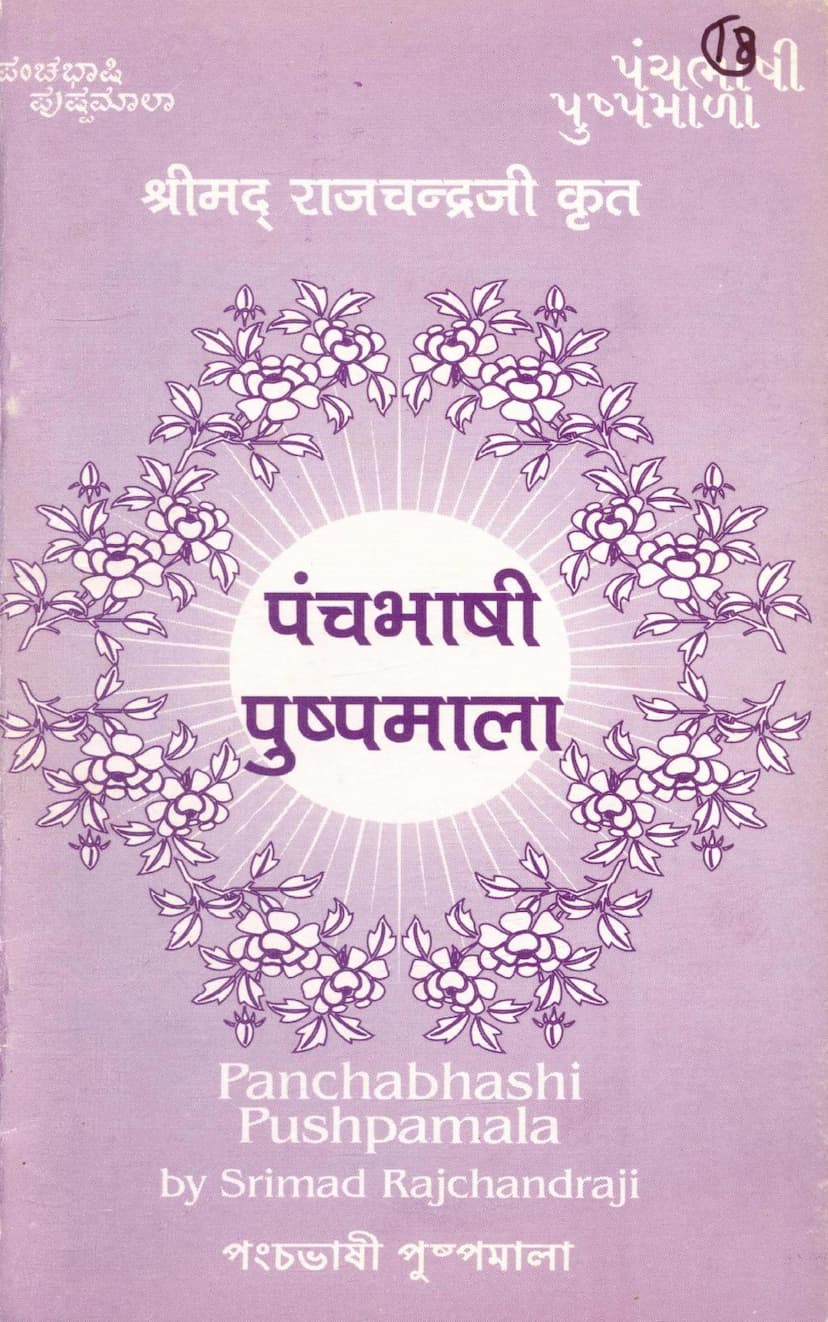Panchbhashi Pushpmala Bengali
Added to library: September 2, 2025

Summary
This document is the "Panchbhashi Pushpmala" (Flower Garland in Five Languages), a collection of spiritual verses by Shrimad Rajchandraji, a prominent Jain mystic and spiritual guide to Mahatma Gandhi. The book is published by Vardhaman Bharati International Foundation.
Here's a comprehensive summary of the provided pages:
Core Theme: The central message of the "Panchbhashi Pushpmala" is about awakening from spiritual slumber and utilizing every moment of life productively for spiritual growth and well-being. It emphasizes the importance of the present moment and encourages readers to engage in mindful reflection and righteous action.
Key Concepts and Messages:
- The Dawn of Spiritual Awareness: The book begins with the idea of the night passing and a new dawn arriving, urging readers to wake up from the "slumber of emotions" (भाव-निद्रा) and overcome the long sleep of ignorance.
- The Present Moment: A strong emphasis is placed on the value of the present moment. The text quotes Bhagwan Mahavir: "This is our true time, our own time – the golden moments of the present." The book advocates for using each passing moment wisely.
- Guidance for Daily Life: The "Pushpmala" is presented as a daily guide, offering practical advice and reflections applicable from morning to evening, for all stages of life, and for people from all walks of life.
- Spiritual Awakening and Action: The verses are meant to inspire spiritual awakening and guide individuals towards righteous actions, ethical living, and the pursuit of knowledge, peace, and joy.
- Overcoming Ignorance and Negativity: The text encourages readers to shake off the slumber of ignorance and strive for a life of awareness, positivity, and detachment from worldly distractions.
- Self-Reflection and Improvement: It prompts self-reflection, urging readers to examine their actions, intentions, and their impact on themselves and others. It encourages taking responsibility for past mistakes and making a commitment to improve.
- The Essence of Jain Philosophy: While not explicitly detailing complex Jain doctrines, the underlying principles resonate with Jain teachings of non-violence (ahimsa), truthfulness, self-control, and detachment. The text mentions the teachings of Tirthankar Mahavir in the context of right conduct and karma.
- The Legacy of Shrimad Rajchandraji: The introductory and editorial sections highlight Shrimad Rajchandraji's profound spiritual insights, even at a very young age. It mentions his prior life memories (जातिस्मृति ज्ञान) and his influence on other spiritual works.
- Multilingual Accessibility: The book's title "Panchbhashi Pushpmala" signifies its translation into five languages: Gujarati, Hindi, English, Kannada, and Bengali. This multi-lingual approach aims to make the spiritual wisdom accessible to a wider audience.
- Call to Action: The book concludes with a prayer for the reader's welfare, wishing them knowledge, peace, happiness, and the development of virtuous qualities like benevolence, compassion, wisdom, forgiveness, discernment, and intelligence.
Structure and Content:
- Introduction/Publisher's Note: The initial pages likely contain introductions from the publishers or editors, setting the context for the book and highlighting its significance.
- Shrimad Rajchandraji's Words: The book features direct quotes from Shrimad Rajchandraji, emphasizing the spiritual message.
- Daily Guidance: The core of the book consists of numbered verses or points offering guidance for each day, touching upon various aspects of life, ethical conduct, and spiritual practices.
- Examples of Guidance: The later pages (23 onwards) show specific examples of this daily guidance, covering topics like:
- Waking up and shedding "emotional slumber."
- Reflecting on the past and making the present fruitful.
- Avoiding wasted moments and seeking self-realization.
- Distributing one's time for duty, knowledge, and rest.
- Contemplating the ephemeral nature of the body and life.
- The importance of right livelihood and avoiding harm.
- Cultivating virtues like patience, purity, and humility.
- The significance of one's behavior in family and society.
- The value of simple living and detachment.
- Seeking forgiveness and acting with integrity.
Overall Purpose: The "Panchbhashi Pushpmala" is a spiritual toolkit designed to help individuals live a more conscious, virtuous, and fulfilling life by focusing on the present moment and striving for inner transformation. It serves as a reminder of the preciousness of time and the importance of spiritual progress.